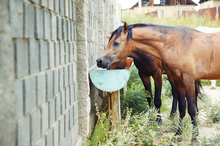Horses in America and their owners are facing challenges. While equines will always capture the hearts of men, equine laws and lobbies are creating tension and horse owners and breeders are facing increasing costs and realities that, for some, offset the benefits.

Hay production and gas prices - Major concerns of horse owners
Horses are not immune to the reality check many owners are facing because of increasing costs of feed and care..
© 2012 by Artist Name
Dry climates are cutting away at agricultural production, and the trickle-down effect is being felt all the way down to the individual farmers. Feed and gas prices are at record-setting highs, and pushing farmers to reevaluate what animals they choose to raise. Horses are not immune to the reality check many owners are facing.
According to a July 2012 report by the National Oceanic And Atmospheric Administration 71 percent of the country is classified as being in a state of abnormally dry to exceptionally dry. And this is no blip on the radar. Besides causing nationwide problems, this is costing local farmers money, resources, and even livestock.
“The cost of keeping horses has gone up dramatically in the past three years,” local horse owner Sheri Peterson said. “The price of hay has doubled.”
The actual price increase on hay isn’t the only problem horse owners face; because hay used in many areas is grown far away, and soaring gas prices are running up the cost as well. Combined with all the other costs associated with raising horses it is becoming too much, and local farmers are steering away from raising horses.
“I used to run 30 horses, and raise 10 to 15 new foals every year,” former Lions Club member Karl Hutchings said. “But when the no slaughter law went into effect, plus the high prices of hay because of the droughts, I now am back down to five horses.”
Controversy is not new in the area of equine law, but tensions are increasing between the two sides of what might loosely be called the horse slaughter laws. In short, while there is not a per se ban on slaughterhouses, laws enacted over the past half-decade removing appropriations for funds to cover inspections have effectively closed them down; the practice of transporting animals across the Mexican and Canadian borders for slaughter is stirring dissension with legislation introduced to defeat or govern that practice.
The Agriculture and Energy Committee, part of the National Conference of State Legislatures, released a statement on the status of the horse industry as part of its 2009 Legislative Summit. In it, they addressed the 1970 Horse Protection Act, and how it applies today. Although the policy statement expired this August, it is informative. In part, it stated:
“The loss of secondary markets has decimated the equine industry, severely impacted the livestock industry as a whole, and by eliminating the salvage value of horses has significantly reduced the market value of all horses.”
One equine law attorney, Alison Rowe, in her equine law blog Aug. 14, 2012, analyzed existing and proposed law impacting the equine and slaughter industries. In it, Rowe argues against any proposed ban:
“The road to Hell is paved with good intentions. That’s about where we’re headed if our federal government kowtows to the radical powerful anti-horse-slaughter lobby, and enacts an outright prohibition of horse slaughter.”
A recent letter, Aug. 17, 2012, from the Animal Law Coalition to the U.S. Secretary of Agriculture, Tom Vilsack, argues an opposing side of the issues in light of some recent movement towards reestablishment of two different slaughterhouses, according to the details stated in the letter.
Even when horses are old, injured, or simply too expensive, owners are forced to look for other methods of relieving themselves of such a financial burden. Horse auctioneers are aware of this, and buying-prices dropped from $3-500 down to around $20 per horse. Horse owners are spending more on gas to get to the auctions than they receive from the sale of their animals.
And, as happens when push comes to shove under economic pressure, these elements have increased the frequency of domestic horses being released in surrounding areas, only to fend for themselves against wild animals.
In Illinois, the skyrocketing price of hay has left some Illinois horse owners overwhelmed.
A spokesman for the Illinois Horse Rescue of Will County says he's been inundated with calls from people to give up their animals because they can't afford to feed them.
The Children's Farm in Palos Park says they get calls every day from people who want to donate their horse because they can't afford to feed it.
The worrisome trend is echoing nationwide. Farmers and ranchers are having a tough time growing hay because of the widespread drought and because of overbreeding, the costs of horse ownership and the abandonment and mistreatment of unwanted horses, times are not good either for horse owners or horses.
